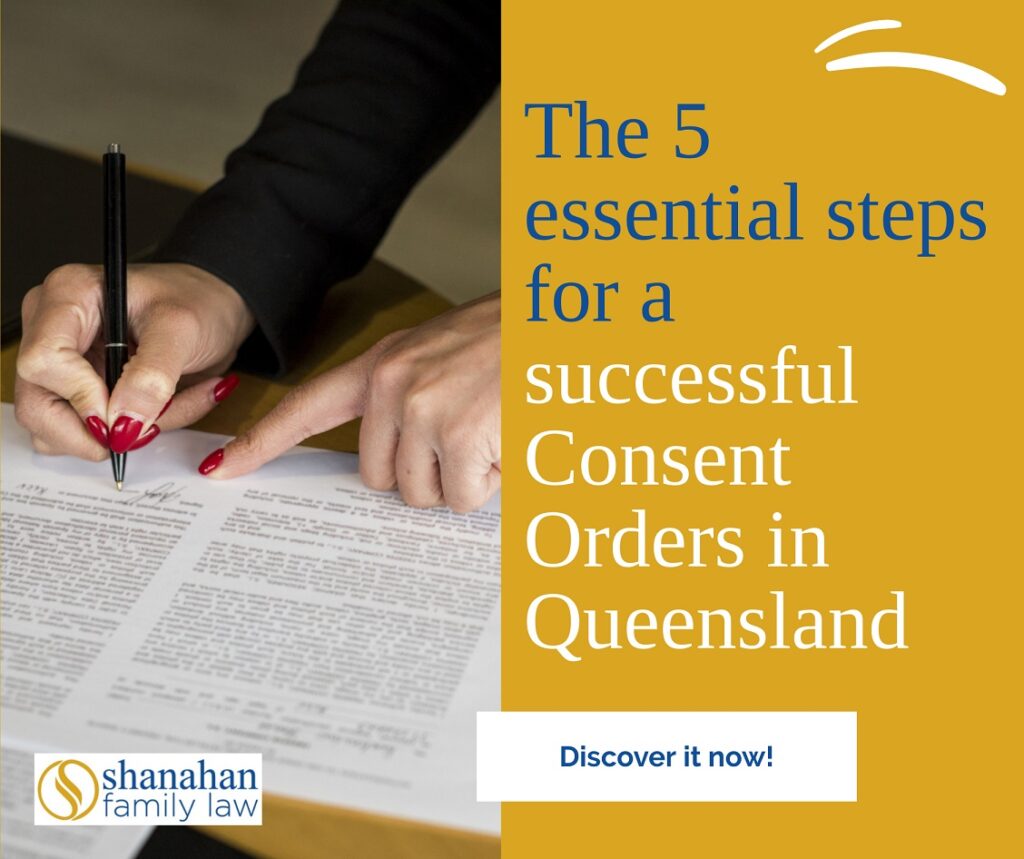‘Consent Orders’ is a term often used in family law discussions, particularly in the context of separations and divorces. But what exactly is a consent order in Queensland (Consent Orders QLD)?
It’s a legally binding court order formalising an agreement between two parties. The parties may be married or in a de facto relationship. In Queensland, consent orders can deal with both parenting arrangements and property matters. However, it’s important to note that financial support, such as child support, is handled separately through a distinct assessment process.
This guide will shed light on applying for Consent Orders QLD and the benefits for you and your former partner.
Key takeaways 
- Consent orders require the parties to have an agreement.
- Fill out the draft consent orders. Property orders and parenting orders have specific considerations parties must adhere to.
- Seek legal advice before entering any legally binding agreement.
- A judicial registrar or judge will assess the proposed orders. If satisfied, the orders will become binding.
Step 1: Crafting a Mutual Agreement
When it comes to matters of family law, Consent Orders serve as a standard means of resolving disputes related to property division and parental matters. The first step in applying for Consent Orders is crafting a mutual agreement between both parties.
Step 2: Filling Out Required Forms
Once the agreement has been reached, you must complete the necessary paperwork. This comprises the Application for Consent Orders and the proposed Consent Orders—often called the ‘draft orders.’
Property orders
A property settlement covers all the assets in a marriage pool. Property brought into the marriage, purchased in the marriage or during separation are all eligible for division.
The Family Law Act outlines how the Federal Circuit and Family Court of Australia handle financial orders. Once the Court has valued the marital asset pool, it will determine the appropriate division based on each party’s contribution to the marriage and their future needs. Once the Court is satisfied the settlement is just and equitable, it will grant the consent order.
Parenting orders
Parenting orders establish the responsibilities each parent has to their children. Consent orders regarding parental responsibility must focus on the child’s best interests. Protecting the child’s best interests is the Court’s only concern. If this criterion isn’t met, the application for consent orders will be rejected.
These forms, detailing your family situation, financial circumstances, and mutual agreement, are available for download from the Family Court website.
Step 3: Seek Legal Advice
Applying for family law consent orders is a significant step with far-reaching implications. While it’s not compulsory, seeking legal advice from a family law solicitor before submitting your application is strongly advised. At Shanahan Family Law, we guarantee the accurate completion of your paperwork and offer insightful guidance on the legal consequences of your agreement.

Step 4: Submitting Your Application
After completing the forms and consulting with a lawyer, you can submit your application to the Family Court. It’s best to submit online through the Commonwealth Courts Portal. A filing fee is associated with this application, but a fee reduction or exemption may be applicable in some circumstances.
Step 5: Awaiting the Court’s consent order review
Upon submission, your application will be evaluated by a Judicial Registrar or a Judge. They will assess the fairness of your agreement and, if children are involved, whether the parental consent orders are in the child(ren)’s best interests. If approved, the consent orders become legally enforceable.
Final Thoughts: Making Consent Orders QLD
Whether you’re dealing with parenting orders by consent, property consent orders, or other agreements, understanding the Consent Order process in Australia is critical. Although the process can appear daunting, breaking it down into manageable steps can simplify things significantly. Remember, consulting family lawyers to comprehend your agreement’s implications is always wise. Contact us today for an initial free discovery call.
The above information is intended to be general advice only and is not a substitute for personalised advice. Because it does not consider your individual circumstances, it is not intended to be relied upon and any loss or damage arising from any such reliance is disclaimed. Any financial or legal decisions should only occur after you have received tailored advice from a legal or financial professional.

